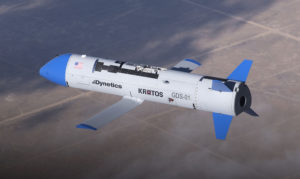
Huntsville defense contractor Dynetics and the advanced weapons agency it works for announced January 17 the successful test of a new, low-cost drone that comes in swarms, called the X-61A Gremlins.
The Gremlins program is contracted by Defense Advanced Research Projects Agency (DARPA). It expects to make relatively cheap UAVs (Unmanned Aerial Vehicle, commonly called drones) that can be launched from the air in swarms and recovered from the ground.
The test Gremlin was not recovered because it crashed after its main parachute failed, but
Dynetics and DARPA declared the test a success of the test. The test took place back in November, at the Dugway Proving Ground near Salt Lake City.
“This flight marks a historic milestone for Dynetics and the Gremlins program,” said Tom Keeter, Dynetics Gremlins program manager. “The GAV flew beautifully and our command and control system kept us in total control of the GAV for the entire flight. The loss of our vehicle validates our decision to build five GAVs for Phase 3; we still have four remaining. Overall, I am proud to see all the hard work pay off and we are excited to continue this momentum towards the first airborne recovery in early 2020.”
The test involved one captive-carry mission aboard a TMB Inc. C-130A and an airborne launch and free flight of the X-61A, which lasted one hour and 41 minutes. The testing demonstrated that the GAV could be launched from the C-130 and that the GAV’s wing deployment, cold engine start and transition to stable, powered flight all operated as designed. The test allowed for the collection of data on the GAV’s subsystem operation and verified that the air and ground-based command and control systems were working. During the flight, the GAV deployed its docking arm and at the end of the flight, its ground (parachute) recovery system.
The Dynetics team was one of four teams awarded Phase 1 in 2016. Phase 2 was awarded in March 2017 to two of the four companies, with Dynetics receiving Phase 3 clearance. The Dynetics Gremlins team consists of Kratos Unmanned Aerial Systems, Williams International, Applied Systems Engineering Inc., Kutta Technologies Inc., Moog Inc., Sierra Nevada Corp., Systima Technologies Inc. and Airborne Systems.
“The flight test validates all the engineering design work, analysis and ground testing we have performed in the past two and a half years,” said Brandon Hiller, chief engineer for the X-61A. “We have a lot of confidence in the vehicle’s performance and overall design going forward, and the telemetry data from the flight compares exceptionally well to our modeling predictions.”
In December, Huntsville-based Dynetics was sold to Leidos for $1.6 billion, a deal that is expected to be completed early this year. Founded in 1969, Leidos has grown into a global, 34,000-employee enterprise. Leidos operates in four key lines of business — civil, defense, health and intelligence.



